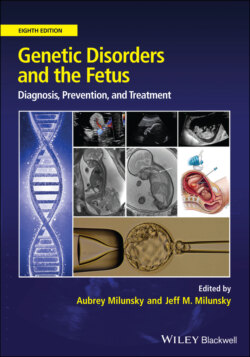Читать книгу Genetic Disorders and the Fetus - Группа авторов - Страница 30
Concern for the individual
ОглавлениеThe ethical principles of beneficence, respect for autonomy, non‐maleficence, and justice (see Chapter 37) underscore the approach to all patients. They are the focus of our concern, not the interests of the state. Although germs and genes occupy the province of the public health authorities, genetic privacy is paramount. This attitude permeates the genetic counseling encounter where many challenging issues will be raised, including the frequent controversial issue of abortion.
Communication should not depend on questions posed by the patient, who may not be cognizant of the subject's dimensions or the available options. For example, in the case of a couple who are at risk of having a profoundly intellectually deficient child, the physician should explore the consequences for the interrelationships of the couple, the effects on their other children, the suffering of the affected child, the possible social stigma,219 and the economic and other societal implications, as well as the need for contraception. Some may feel that the economic burden of a defective offspring on society should at least be mentioned as part of a comprehensive view of all issues being considered. However, our concern is for the individual, whose priorities, needs, and choices remain paramount. In the physician/counselor–patient relationship, concern for the individual should always override consideration of the needs of society. Many avenues exist for society to influence the actions of its citizens. In genetic counseling, the role of the physician/counselor is not that of an advocate for society.
A couple may elect to have an amniocentesis that is indeed indicated without making a commitment to pregnancy termination if the fetus is found to be abnormal. Some may deny such couples the opportunity for prenatal genetic studies. All couples have a right to have information about their fetus and prenatal diagnosis is a fundamentally reassuring technique. More than 95 percent of such couples do not need to consider elective abortion. The few who are initially ambivalent almost invariably move to terminate the pregnancy after the detection of a serious fetal defect. Nevertheless, abortion may be declined after the prenatal diagnosis of lethal or severe disorders such as anencephaly or trisomy 13. O'Connell et al. have described the profoundly emotional journey and the adaptive grieving process of four mothers who, after prenatal diagnoses of anencephaly, continued their pregnancies to delivery.296 Concern for the individual includes providing ambivalent couples with the opportunity for reassurance or the choice to decline abortion with preparation for the consequences. Moreover, opportunities to save their offspring's life, or at least to improve the outcome, now exist in specific circumstances (see Chapters 29 and 30). The availability of adoption should always be discussed.
Quite often, a patient declines an otherwise clearly indicated amniocentesis. Today, the standard of care dictates the need for an explanatory note in the patient's record. A brief letter to the patient noting the indication for prenatal study and that such study was declined is also helpful. Litigation has ensued in which patients have maintained that no amniocentesis had been offered, while obstetricians (without notes in the records) have taken an opposite view.
The counseling session provides an opportunity to also contribute to the overall psychological health of the patient. Counselors should therefore spend significant time helping patients to apply the information to their lives and should not be wholly focused on communicating genetic information.297
